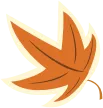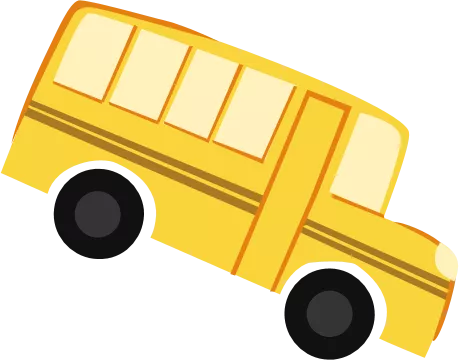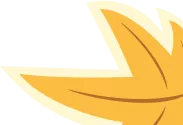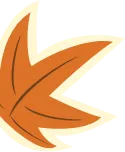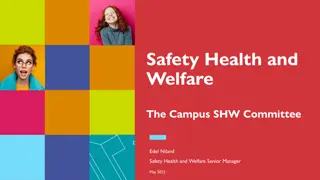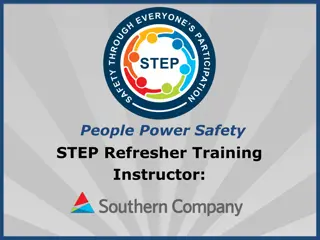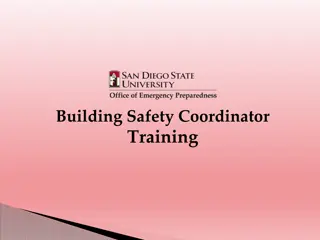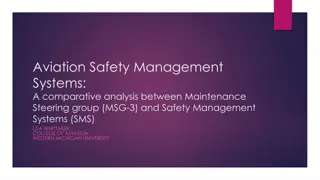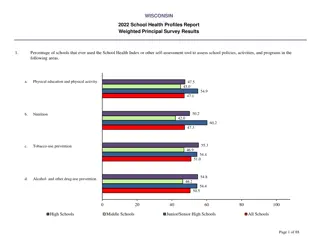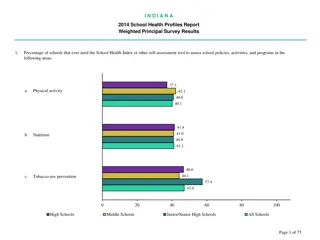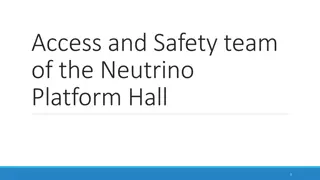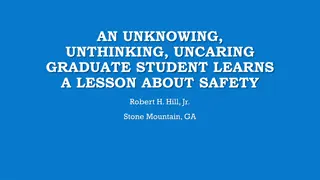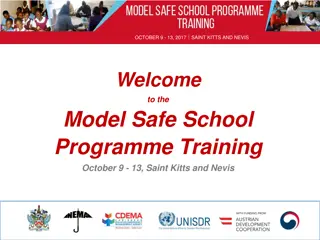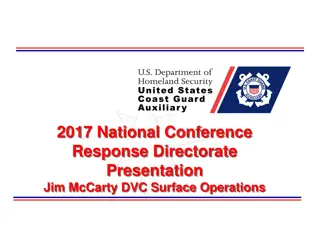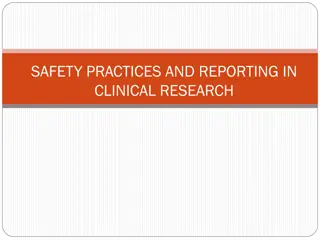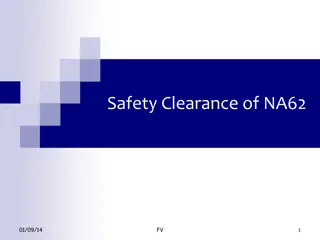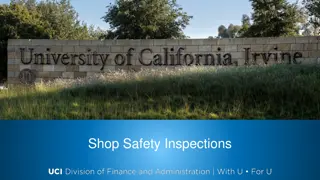School Health and Safety Training Program Overview
This overview provides information on the School Secretary Training program conducted for Patty Morris, RN/PHN, MSN at SCOE in August 2021. Topics covered include TB risk assessments, CPR/AED/First Aid, handling illnesses and injuries, immunizations, medications, and more. Details on TB risk assessments, CPR/AED/First Aid courses, and guidance on managing health concerns in school settings are highlighted. Additionally, contact information for Patty Morris and Elizabeth Robinson is provided for further inquiries.
Download Presentation

Please find below an Image/Link to download the presentation.
The content on the website is provided AS IS for your information and personal use only. It may not be sold, licensed, or shared on other websites without obtaining consent from the author. Download presentation by click this link. If you encounter any issues during the download, it is possible that the publisher has removed the file from their server.
E N D
Presentation Transcript
School Secretary Training Patty Morris, RN/PHN, MSN SCOE August 2021
CONTACT INFORMATION: Patty Morris, Health Services Director 842.8425 or pmorris@siskiyoucoe.net Elizabeth Robinson, Executive Assistant 842.8405 or erobinson@siskiyoucoe.net
TOPICS COVERED: TB Risk Assessments Back to school packet CPR/AED/First Aid Health Insert Illness and Injuries Immunizations Medications School entry physical Specialized Physical Healthcare Plans Oral health assessment AEDs, Stock Epinephrine Auto- injectors and Naloxone Contagious illnesses and illness surveillance Lice
TB RISK ASSESSMENTS California law requires that school staff working with children be free of infectious tuberculosis (TB). A law enacted on January 1, 2015 requires a TB risk assessment be administered to school employees and volunteers every four years instead of the TB skin testing. School districts with employees or volunteers who want to take advantage of this option under the law will need to establish their own policies and make arrangements with a health care provider of their choosing. The risk assessment must be completed by the health care provider who is responsible for doing the assessment, signing it, then providing the Certificate of Completion to the employee. School districts must keep this document on file instead of the TB skin test results.
TB RISK ASSESSMENTS (CONTINUED): Staff who have tested positive in the past and have a documented negative chest x-ray on file should also be screened for additional risk factors every four years (there is a specific questionnaire designed for this purpose). The TB Risk Assessment and Certificate of Completion can be completed by a Registered Nurse. If your school site would like to contract with SCOE for nursing services, a Credentialed School Nurse will come to your school site and provide the service.
CPR/AED/FIRST AID: For coaches, staff who have students with health concerns, and secretaries North and South County courses are scheduled in the fall Dates, locations and cost in the Back to School Packet
ILLNESS AND INJURIES: Call nurse if question (should have monthly calendar, call Elizabeth if you cannot contact the School Nurse assigned to your school) Let nurse know about chronic conditions, medications, ongoing health concerns, attendance problems, SST s Nurse will do school staff trainings for health concerns when required
MEDICATIONS: Always call the school nurse when a student needs to take medication at school and when the parent brings a refill, even if it is the same medication they have been taking. Never give a medication that has not been checked by the school nurse. Medications to be given to the student during the school day must have an order from a California licensed Doctor, Nurse Practitioner or Physician Assistant and a parent signature (this includes over the counter medications such as Tylenol, ibuprofen, Benadryl, lotions, ointment, eye drops).
MEDICATIONS (CONTINUED): Medications must be in the original labeled container. Although medications can be given during school hours, we encourage parents to try to give medications at home when possible. Secretaries or health clerks should make a copy of medication orders when they arrive and put the copy in the student s health insert. There is a medication training document that must be completed by any school employee before they assist a student with medication! Ask your School Nurse!!
SPECIALIZED PHYSICAL HEALTHCARE PLANS Children with health concerns will be attending school. It is important to notify your School Nurse if a student with a health condition enrolls in school, or if a current student has a newly identified health concern. Some of the plans include: Anaphylaxis Diabetes Asthma Fainting Seizures Once the health concern is identified, the School Nurse will develop a plan with the parent and student s Doctor. The School Nurse will train school staff to implement the plan.
CONTAGIOUS ILLNESSES AND ILLNESS SURVEILLANCE: Forms for tracking and reporting on SCOE Health Services Department website Calling on all absences and logging information Report to Public Health Department (PHD) weekly WHY? Required if a severe flu outbreak Helpful for SARB Process Identify problems early
CONTAGIOUS ILLNESSES AND ILLNESS SURVEILLENCE (CONTINUED): COMMUNICABLE DISEASE COMMUNICATION PLANS: School Administrator signs an agreement with the Public Health Department to participate in the program Documents sent to the school by SCOE Director of Health Services When a communicable disease occurs in the school, someone at the school will contact the School Nurse assigned to the school to consult If indicated, parents will be notified in writing to inform them of the presence of a contagious/communicable illness in the school The letters are sent by the school on behalf of the Public Health Department and should never be sent without consulting the School Nurse
BACK TO SCHOOL PACKET: E-mailed to School Secretaries in August Information about: Immunization law changes and PHD clinics (also on PHD website: Siskiyou County PHD IZ Clinic Schedule) CPR/FA/AED courses and sign ups School Nurse assignments and contact information Any other information or resources for new issues (changes in laws, pandemic info, air quality)
BACK TO SCHOOL PACKET (CONTINUED): Type 2 Diabetes Letter for all incoming 7thgraders. Adapt letter for your school and administrator. Send out letter, information sheet developed by the state, and list of providers in your BTS Packet
HEALTH INSERT: Order Health Insert from: https://www.supremeschoolsupply.com/ Health Record Insert Item #SSCA60C California School Immunization Record (usually printed on blue cardstock): Can be printed from school attendance software program Can be downloaded and printed from the California Immunization Registry
HEALTH INSERT (CONTINUED): Enter hearing and vision screening results (provided by the School Nurse) in the spaces provided OR print a copy of the results from the attendance software program an place in file Enter color vision results (provided by the School Nurse) for 1stgrade boys in the space provided OR print a copy of the results from the attendance software program and place in file Any other health related information should be placed in the Health Insert including: School entry physical Medication orders Hearing and vision referrals Immunization records Health Questionnaires Specialized Physical Healthcare Plans
IMMUNIZATIONS: Check for required immunizations before enrolling a student in school: Go to www.shotsforschool.org Click on K-12 or Seventh Grade (depending on what you are looking for) All of the information you need for TK/K school entry, entry into seventh grade and transferring students is on this website *Students who are homeless or part of the Foster Care System must be enrolled in school regardless of their immunization status. You will need to work with their parent, social worker or School Nurse to access their immunizations or assist them in getting required immunizations.
IMMUNIZATIONS (CONTINUED): For anything you would ever need or want to know about school immunizations, please go the Siskiyou County Office of Education website. Click on the Departments tab Click on the Health Services link Click on the Immunizations link!! http://www.siskiyoucoe.net/Page/1 Your School Nurse may assist you in finding immunization records for students by checking the California Immunization Registry. If you would like access to the registry, check with your School Nurse.
IMMUNIZATIONS (CONTINUED): KINDERGARTEN: When parent picks up the K Registration Packet, remind her/him that their child will probably need four year old shots and it should be done before the child is registered and the record needs to accompany the registration material. Information is in packet. When parent brings in registration packet, an immunization record should be with it Check the record while the parent is there. If immunizations are missing, give them a completed Required Immunizations letter and refer them back to their health care provider.
IMMUNIZATIONS (CONTINUED): Emphasize that the child is not officially registered until immunizations are completed. If you allow the child to attend school, most likely you will have a long, time-consuming process of bringing the child into compliance, and the school may incur an adjustment in their apportionment of ADA. Work with your administrator & School Nurse Make sure a copy of the immunization record is attached to the CSIR and put in the student s health insert. Updated PHD immunization clinic schedule is on their website Forms and letters to send to parents are on the SCOE Health Services website More information and forms are on this website: www.shotsforschool.org
IMMUNIZATIONS (CONTINUED): SEVENTH GRADE: All students entering, advancing or transferring into 7th gradewill need proof of an adolescent whooping cough booster immunization (called Tdap ) for school in the fall. This law affects all students in public (including charter schools) and private schools. As with all required immunizations, it is very important to enforce this requirement. No student should be allowed to attend 7thgrade unless this requirement is met. There is no grace period and no conditional admission for this requirement. Students who have had exemptions from immunizations in the past or are missing immunizations will need to be caught up on all missing immunizations before advancing into seventh grade. Please see the Immunization section on the SCOE website for more information and resources for reminding parents of immunizations that will be needed to continue in school.
IMMUNIZATIONS (CONTINUED): EXEMPTIONS: In California, there are no exemptions to the required immunizations for religious or personal beliefs Medical Exemptions can be written by an California licensed MD or DO Parent requests the medical exemption from their child s physician California schools can access the CAIR Medical Exemption web site once a child attending the school or child care facility has been issued a medical exemption in CAIR-ME. If your school or child care facility has received a medical exemption in CAIR-ME, you can request access by emailing medicalexemptions@cdph.ca.gov For more on medical exemptions, go to: https://www.shotsforschool.org/
IMMUNIZATIONS (CONTINUED): IMMUNIZATION REPORTS: Immunization reports are required for TK/K and seventh grade students (in 2021 reports will be required for first and eighth grades as well) The California Department of Public Health, Immunization Branch will send you a letter with instructions on doing online reports and the deadlines. Kindergarten report usually due on or before October 15 Seventh grade report usually due on or before November 1 Make a copy of report before you forward it to the state or you may lose it (cannot be saved). For more information about filing these reports, go to: http://www.shotsforschool.org/
SCHOOL ENTRY PHYSICAL: Information and form are in K Packet (also on SCOE HSD website). This exam is also called the CHDP (Child Health Disability Prevention) exam. Physical can be within 18 months of starting first grade, but is usually done when children get their last set of immunizations before beginning T/K or K. Not needed until first grade, but schools can require it for K Required to have physical or waiver signed within 90 days of starting 1stgrade (before Thanksgiving break) Record the date of the exam in student s Health Insert. Visit this website for more details on this mandate: http://www.dhcs.ca.gov/formsandpubs/publications/Documents/CMS/CHDPPub108.pdf Please note that although there is no longer a report of Physical Examination for School Entry to be made to the State of California (and reimbursement for the report), the examination is still a state mandate.
ORAL HEALTH ASSESSMENT: Initial information is in K packet. All forms will be on SCOE HSD website. Dental screening can be done within 12 months of starting kindergarten. Send out reminder with form and list of dental providers in the fall. Track with immunizations and 1stgrade physical In May, compile data and submit report: SCOHR website. For more information contact SJCOE at scohr@sjcoe.net or call 866.762.9170.
AEDs, STOCK EPINEPRINE AUTO-INJECTORS, AND NALOXONE: Schools with Epi-Pens: As of January 1, 2015, ALL schools are required have an unassigned epinephrine auto- injector program. Schools have the option to have stock Naloxone. Someone at your school site should be responsible for checking the Epi-Pens and Naloxone and logging the checks monthly. If your school site does not have either of these programs and would like information about getting them, contact Patty Morris. Schools that have AEDs: Someone at your school site should be responsible for checking the batteries, providing maintenance and logging the checks monthly or as per your school policy.
LICE: Head lice are small insects that live in people s hair and feed on their blood. Lice glue their eggs, also called nits, to hair. Lice can be a nuisance, but are not dangerous and can affect anyone. Lice do not jump or fly, but are usually spread by head to head contact. The best way to avoid transmission of lice is to teach children not to share hats, combs, brushes, etc. and not to touch heads with other children. Children with long hair should wear their hair in a braid or pony tail. Parents should learn how to check their children for lice at home.
LICE (CONTINUED): Designated people in schools can be trained to check individual children for lice if requested by a parent or the student. Checking for lice does not require a nursing license or credential. Any trained person can do it. Students with lice are not usually sent home. The student s parents are notified before the end of the school day. The School Nurse can call in a prescription for medication to treat lice if the student has Medi-Cal insurance. Students can return to school after they have been treated. Education and information about lice for schools and parents can be found on the SCOE Health Services website.
We appreciate your assistance in keeping our students healthy so they can stay in school and learn! Do not hesitate to contact the Health Services Department at 842-8405. Also, check out the other links on our website! SCOE HSD
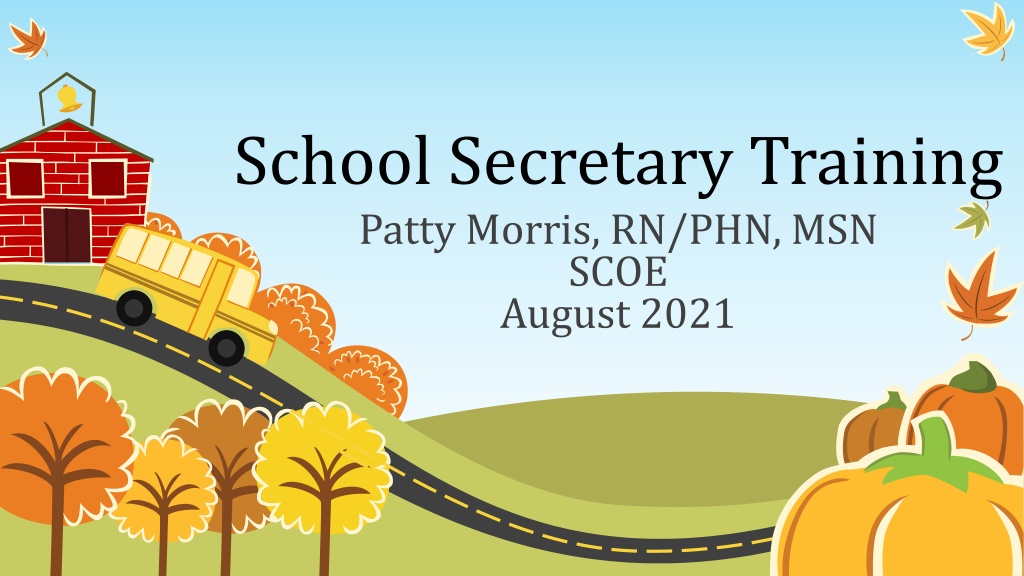
 undefined
undefined
